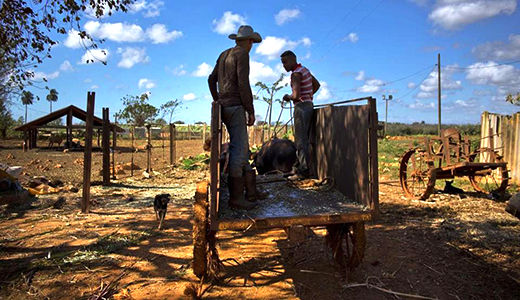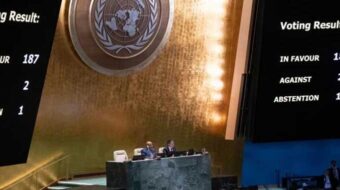
United Nations agencies, notably the World Health Organizations, UNESCO, and the Food and Agriculture Organization (FAO), have often praised Cuba for achievements in satisfying its people’s basic needs.
On May 30 in Havana, the FAO representative in Cuba, Theodor Frederick, testified to the Cuban government’s success in maintaining food security for all Cubans. He based his remarks on the recently published FAO document titled “Panorama of Food and Nutritional Insecurity in Latin America and the Caribbean- 2015.”
Some of the data provided in that publication appeared earlier in the FAO publication “The State of Food Insecurity in the World – 2014,” which offers a wide-ranging survey of hunger in the world – more precisely, under nutrition. It cites a total of 805 million persons who were hungry that year, or nine percent of the world’s population.
Latin America and the Caribbean “registered the greatest progress [among regions of the world] in reducing hunger,” according to the publication.
Theodor Frederick’s comments, taken from the “Panorama” report, are more revealing than the actual data as to Cuba’s exemplary role within Latin America in promoting adequate nutrition. That’s because the FAO system of data recording abandons numerical specifics once the tally of hungry people in a nation falls below five percent. At that point numbers are replaced by “n. s.” signifying “not significant.”
As reported by journalist Jose Manzanada, Frederick “emphasized the role of the state in Cuban food security, evidenced in generous subsidies provided to cover the costs of basic foods which supply half of the individual’s nutritional requirements. The state [also] makes food available at health centers, schools, and workplace dining rooms that is free or at the lowest price. Food is provided for vulnerable groups such as people who are sick, handicapped, or elderly.”
Yet numbers appearing in the two FAO reports are telling. Under-nutrition afflicts 51.8 percent of Haitians, 14.7 of people in the Dominican Republic, 14.3 percent of Guatemalans, 12.1 percent of Hondurans, but fewer than five percent of Cubans.
In Latin America and the Caribbean, the number of undernourished people dropped from 66.1million in 1990-02 to 34.3 million in 2012-14. During the same period the percentage of the hungry fell from 14.7 percent to 5.5 percent. In Cuba 600,000 people – 5.7 percent – were hungry in 1990-02. Since then the numbers have shown as “n.s.”
Importantly, “Cuba – with Venezuela – is among the 29 countries of the world – [11 of them in Latin America and the Caribbean] – that have fulfilled the goal proposed at the 1996 World Food Summit in Rome in of reducing the number of the world’s hungry people by half as of 2015.”
One of the Millennium Development Goals, proposed by the United Nations in 2000, spoke of hunger. The goal was set that over the next 15 years nations would reduce the percentage of their hungry people by half. Sixty three countries, all of them in the poor world, have done so; 17 are in Latin American and the Caribbean. And 11 of them have “maintained the prevalence of under nutrition at below 5 percent,” Cuba among them. Caloric intake in Cuba has recently averaged a relatively high 3,533 calories per person for 2012 – 2014, according to the FAO.
Manzanada, however, points out that Cuba may be facing difficulties in maintaining future food supplies. He claims that the $2 billion annual cost of importing food results in part from shipping costs that are 30 percent extra due to the U. S. economic blockade.
He refers also to problems with food production, without providing details. Indeed, 2.5 million of Cuba’s 16.1 million acres of usable land still remains idle, even though, beginning five years ago, 3.7 million acres have been delivered to 174, 000 new farmers or to cooperatives on a long-term usage basis. Presently Cuba has to import almost 70 percent of food it needs for domestic consumption.
Significantly, Cuba has struggled not only to feed its own people, but has also promoted efforts toward food sufficiency in the region. Cuban leaders joined former Venezuelan President Hugo Chavez in founding and shaping the Community of Latin American and Caribbean States (CELAC), an alliance epitomizing trends toward long – anticipated regional unity.
In March 2015 at its third Summit meeting, held in Chile, CELAC launched its “Plan for Food and Nutrition Security and Eradication of Hunger 2025.” CELAC had collaborated in the effort with the FAO and two regional organizations. The Latin American FAO representative, Raúl Benítez, told reporters he anticipates “a region free of hunger.”
Photo: A worker rides on an oxen-drawn cart as he heads to work at an agricultural cooperative in Cuba. | AP












Comments